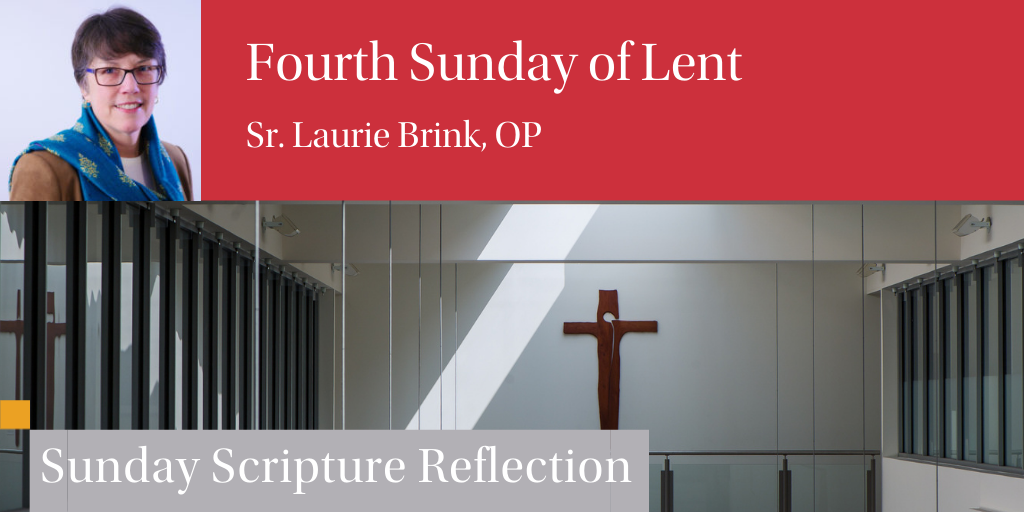

Readings:
Reading I: Joshua 5: 9a, 10-12
Psalm: 34: 2-7
Reading II: 2 Corinthians 5: 17-21
Gospel: Luke 15: 1-3, 11-32
What’s wrong with this picture? That’s the first question I urge my students to ask of a parable like the one we find in today’s Gospel. Parables are the biblical version of a bait and switch. They introduce you to a scene that seems familiar enough. In this case, a dissolute younger sibling, a jealous older sibling, and a ridiculously generous parent. They invite you into the narrative, so that you begin to identify with the characters, and you think you know where the story is going.
As Luke presents this parable, Jesus is addressing the Pharisees and Scribes who are grumbling about whom Jesus eats with—in this case, tax collectors and sinners (Luke 15:1-2). We have to hear the parable through the first century ears of the narrative audience (these Pharisees and Scribes) and Luke’s authorial audience (those he expected would hear his gospel). What’s wrong with this picture for them? First, for the son to ask his father for his inheritance is tantamount to saying, “I wish you were already dead.” Sirach 33:20-24 warns against such action, which could lead to financial ruin. Not to mention the shame brought upon the family! Children were expected to honor and obey their parents (Exod 20:12). In Roman society, the father had patria potestas—life and death over his children. So the first surprise is not only that the son is so very disrespectful, but that the father gives in to his request!
Next the audience would recognize the connotations of the young man’s feeding of pigs, in other words, his working for a Gentile. He has wholly and completely lost his familial and religious identity. As the audience hears this parable, it would agree with the young man’s self-reproach, “I have sinned against heaven and before you. I am no longer worthy to be called you son” (Luke 15:18-19). “Hah!” the audience would exclaim. “You wanted your father dead but look at you. You’re as good as dead. Fat chance he’ll take you back now!”
The younger son has nowhere else to go. His motivation isn’t remorse but hunger. He expects to be treated as a hired hand. But just when you think you know what will happen, the other shoe drops: “But while he was still far off, his father saw him and was filled with compassion; he ran to him and put his arms around him and kissed him” (Luke 15:20). “While he was still far off” indicates that the father has been standing as a sentinel watching for his son’s return. Before the son can repent, the father displays compassion for him. The one who had so generously given of his wealth now is equally extravagant with his compassion. The patient parent not only receives his son, but treats his return as miraculous. “For this son of mine was dead and is alive again!” (Luke 15:24, 32).
But wait, the parable isn’t done with us yet.
Here comes the “good” son in from the field. The one who didn’t leave his father or demand his inheritance. The one whom we presume has faithfully fulfilled his responsibilities to the father. Will the ideal son live up to the adage, “like father, like son”? and display the same lavish compassion as his father? And that may be the point that Jesus is trying to make with the Pharisees and Scribes. Will they see the tax collectors and sinners as their brothers and sisters and respond with compassion? Or will they remain outside the celebration? The parable is less about a wayward son who repents, and more about a self-righteous one who chafes at compassion, and about the parent who cares for both.
Luke is particularly concerned about lost things—lost sheep, lost coins, lost children. The parable is often called “The Prodigal Son” but the point of the story is not the prodigal or lavish spending of the younger son, but the lavish and extravagant love of the waiting parent. The murmuring Pharisees and scribes complained about the company Jesus kept. More likely, this murmuring was heard in Luke’s own community, which probably held both wealthy and poor, those with status and those without. Luke challenges his own church to be lavish in their love for one another.
This is precisely what St. Paul is proposing in the second reading. “Whoever is in Christ is a new creation” (2 Cor 5:17). This new creation is the result of the compassion of Christ, who “was reconciling the world to himself, not counting their trespasses against them, and entrusting them with the message of reconciliation to us (2 Cor 5:19). Like the reading from 2 Corinthians, the parable witnesses to the hope of reconciliation—the lost are found, and the dead brought back to life. But as the parable shows, the choice is ours. Will we be reconciled to God and thus become ambassadors of that reconciliation? Or will we stand outside the celebration, begrudging the compassion and generosity of God?